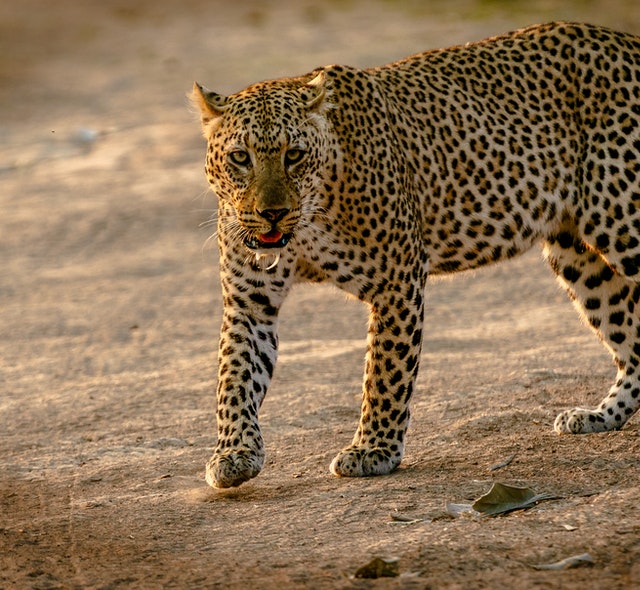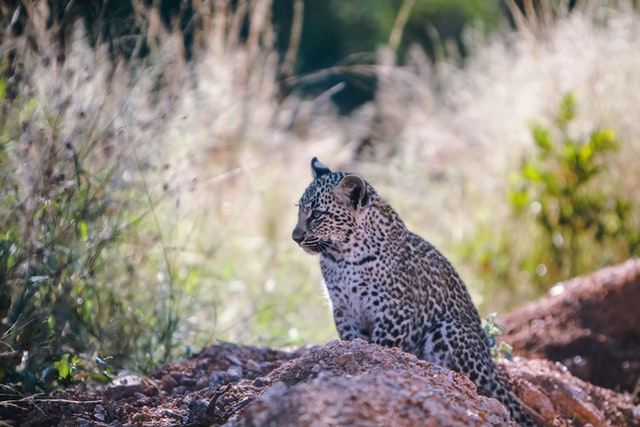
- Leopards are very secretive and territorial in their behavior
- Black Leopards
Africa facts zone presents lots of fun facts on leopards. The leopard, one of the Big Five animals that can be found in many national parks across east Africa and the continent as a whole.
Leopards may be found in many national park across Africa;
- In Uganda leopards are found in Queen Elizabeth national park, kidepo valley national park, Lake Mburo national park, Murchison falls national park and Semuliki national park.
- In Kenya leopards are found in Samburu national park and Masai Mara national reserve
- Tanzania leopards are found in Serengeti national park, Ngorongoro conservation area, Tarangire national park and Lake Manyara national park.
- Rwanda leopards are found in Akagera national park
Also Read: Top African Safari Wildlife Park And Its Thrilling Scenery
Top Fun Facts on Leopards
Leopards are very secretive and territorial in their behavior

One of the fun facts about leopards in contrast to lions is that they are solitary cats that have a lonely and isolated existence.
In their natural habitat, leopards are usually seen walking alone through the grasslands, and the only time they are seen in a pair, consisting of a male and a female, is during the mating season.
When a female is ready for mating, she signals this readiness to her mate by the scent of her territory markers, such as her own urine.
The mating phase lasts for 4 – 5 days, during which time they (male and female leopards) hunt together and mate 70 – 100 times each day.
The mating period is followed by a gestation period of 3 months, during which only 2-3 babies have a chance of surviving, and then the cubs are born.
Immediately after mating and gestation, as well as after the delivery of pups, leopards return to their solitary way of life.
Fun Facts on Leopards: They are not fussy eaters
Another fun facts on leopards, they are opportunistic carnivores that devour a broad range of food depending on what’s available in their immediate vicinity.
They aren’t choosy when it comes to what they eat.
Their preferred food includes medium-sized animals like as impalas, spotted deer, and bushbucks; however, they may also consume tiny and big prey.
Leopards are very adaptable cats
Leopards have been seen to be adaptable cats, which has allowed them to survive in a variety of environments.
Due to their ability to adapt to any environment, leopards are found in a variety of habitats across Africa.
As opposed to other cats such as lions, who prefer to reside in conquered areas near water supplies.
Fun Facts on Leopards: They are nocturnal creatures
Leopards are nocturnal creatures, and they prefer to spend their evenings foraging for food rather than resting at home.
These magnificent cats have a night vision that is seven times superior than that of humans.
Fun Facts on Leopards: They like to reside in or near trees
Leopards make use of trees to their benefit in a number of their environments.
They are exceptional climbers and are the most arboreal of the big cats, with the exception of lions.
Leopards often seek refuge in trees when confronted with danger or hostility.
Aiming to evade notice by other predators, they sleep on the limbs of trees during the daylight hours.
They are capable of mating with other large cat species
In spite of the fact that leopards in the wild are violent against other large cats, leopards in captivity have been mated with other big cats.
Leopards in captivity successfully interbred with lions in captivity, which is quite interesting facts on leopards.
When male leopards mate with female lions, they create leopons, which are the offspring of the breeding pair.
Leopards are the child of a male lion and a female leopard, while lions are the offspring of a female leopard.
Jaguars have been successfully crossed bred with leopards, resulting in the production of jaguars and leguars.
Although efforts to breed tigers and leopards have been made in the past, they have only resulted in stillbirths.
Also Read: Facts About African Lions
Leopards in the wild have a lifetime ranging from 12 to 17 years on average.
Leopards may live up to 12 to 17 years in the wild, depending on their environment. In captivity, on the other hand, they have a substantially higher life expectancy.
McCarthy’s Wildlife Sanctuary at The Acreage, Palm Beach County, Florida, is home to the world’s oldest known leopard, a female leopard who lived more than a century ago.
At the age of 24 years, 2 months, and 13 days, Roxanne the leopard succumbed to natural causes in 2014.
Humans are very infrequently attacked by them.
One of the fun facts about leopards is they seldom approach people and are less prone to become man-eaters when compared to lions and tigers, who are more likely to do so.
They prey on monkeys and apes, but humans are an uncommon prey item for these predators.
They are more likely to come into confrontation with people if they attack their cattle, which is more common.
When their normal prey species become few, they will turn to attacking people as a means of surviving.
Fun Facts on Leopards: The cubs are born blind

Leopard cubs are born blind and very defenseless, making them ideal prey for predators. They are completely reliant on their moms for their survival.
The first time their eyes open is roughly ten days after birth, and they remain vivid blue during the first several months of their lives.
Also Read: Safari in Kruger National Park, South Africa
Black Leopards

Because black leopards have dark fur, it is difficult to distinguish the markings on their bodies.
Due to the fact that their coats are sometimes nearly completely black, they are usually referred to as black panthers.
The variation in hue does not indicate the existence of a distinct subspecies.
Instead, their dark-colored patches are caused by a high level of melanin pigmentation in the skin, which is the polar opposite of albinism.
They have been seen throughout Africa, albeit they are quite uncommon.
No two leopards are same in appearance; each leopard has a distinctive spot pattern.
Source Credit: africafreak.com, facts.net, focuseastafricatours.com




